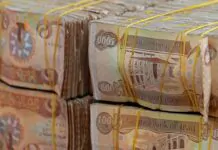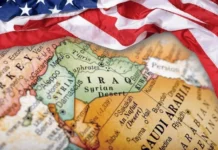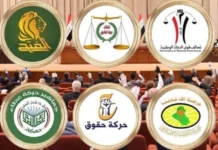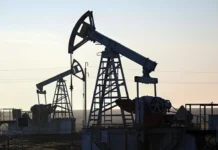They Made Half A Billion In A Year… E-Cards Become A “Dollar Smuggler” After The Remittance Loophole Was Closed In Iraq.
Economy 2025-06-01 | 6,035 views Alsumaria News-Politics revealed The Wall Street Journal on Sunday details that led to the reduction of withdrawal and spending limits on electronic cards outside Iraq, and the suspension of many of them.
The newspaper pointed to a jump of approximately 3,000% in MasterCard and Visa card transactions in Iraq, as armed factions and entities smuggling dollars to Iran resorted to these cards after losing the financing loophole through import remittances. The newspaper stated, “Just two years ago, the Iraqi market represented marginal value for Visa and Mastercard, generating less than $50 million per month in cross-border transactions at the beginning of 2023.
However, this value exploded to nearly $1.5 billion in April of the same year, an increase of nearly 2,900% in a short period.”
The newspaper notes that what has changed, according to American and Iraqi officials and documents, is that armed factions have been extracting dollars through these cards, via the Visa and MasterCard payment networks,
after the US Treasury Department closed a major loophole used to fraudulently obtain dollars via foreign money transfers.
The newspaper explained that the factions had found a plan to use electronic payment cards after this loophole was closed, but the Treasury informed the card-issuing companies that armed groups were involved in using these cards.
It took the companies months to reduce financial transactions, and these transactions declined,
but remained between $400 million and $1.1 billion per month until the beginning of this year.
The Central Bank even recently set a maximum of $300 million per month to control these payments.
The newspaper explains that because of the existence of an official and an unofficial rate, people would
purchase electronic cards and withdraw them in dollars outside Iraq in other Middle Eastern countries at the official rate.
They would then send the funds back to Iraq to be converted into dinars at the market rate,
earning profits of up to 21%.
The result was a thriving trade for powerful Iraqi factions.
The newspaper confirms that Visa and MasterCard generated profits from these transactions ranging between 1% and 1.4%.
Iraqi cardholders participating in the scheme are estimated to have generated profits of approximately $450 million in 2023 alone, while foreign cards alone generated $120 million.
Revenues are estimated to have grown by 60% in 2024.
The newspaper says that in recent days, the Treasury Department has formally requested that the Central Bank of Iraq block more than 200,000 cards held by militia members due to fraud concerns.
Meanwhile, Federal Reserve and Treasury officials have begun asking Visa and Mastercard to explain the increase in transactions in Iraq in 2023 and have held regular meetings on the Iraqi market, including with officials from the Central Bank of Iraq in 2024 and early this year.
Card companies began taking concrete action in March.
https://www.alsumaria.tv/news/economy/528261/ربحوا-نصف-مليار-في-عام-البطاقات-الالكترونية-تتحول-الى-مهرّب-دولار-بعد
Mogadishu Refinery Find Triggers Iraq’s Hunt For $100B In Lost Global Assets
Iraq Jawad Al-Samarraie May 30, 2025 AL Rafidain Bank branch in London, opened in 1954
Baghdad (IraqiNews.com) – A startling revelation at the Arab Summit in Baghdad this May has jolted Iraq into confronting a forgotten legacy:
a sprawling international portfolio of properties and investments, potentially worth at least $100B,
that has languished in neglect and obscurity for two decades.
The unexpected news of a large, Iraqi-built oil refinery still standing in Mogadishu, Somalia, has served as a dramatic wake-up call, triggering a renewed effort to trace and potentially reclaim these vast, squandered national assets.
The ghost refinery in Mogadishu, constructed in 1978 under a bilateral agreement and largely forgotten by Iraqi officialdom since 2003, was brought back to Baghdad’s attention by Somali President Hassan Sheikh Mohamud.
He informed Iraqi Prime Minister Mohammed Shia Al Sudani that the facility merely requires technical rehabilitation to become operational – a timely prospect as Somalia begins exploring offshore oil.
This single revelation underscored a much larger, more complex issue:
Iraq’s dozens of lost properties scattered across three continents.
During its oil-boom years in the 1970s and 1980s,
Iraq strategically invested its wealth globally, acquiring an estimated 50 significant assets.
These included luxury palaces and real estate in prime European locations like Cannes, France, Spain, the UK, and Italy; agricultural ventures such as tea, rice, rubber, and tobacco farms in Malaysia, Sri Lanka, and Vietnam; and diverse holdings in Africa, from tourist islands and agricultural factories in Mozambique and Nigeria to the aforementioned Somali refinery.
This was a policy of extending economic and diplomatic influence.
However, following the 2003 regime change, this global portfolio fell into disarray.
Iraq’s Parliamentary Integrity Committee previously revealed to news agencies that
crucial ownership documents were stolen or destroyed.
Some properties were illicitly transferred to individuals or shell companies linked to the former regime,
while others simply vanished from official oversight, becoming a forgotten treasure.
Early attempts at recovery highlighted the dangers.
In 2012, an Iraqi Foreign Ministry delegation dispatched to Mozambique to inspect a state-owned asset,
believed to be a palace on a tourist island, received direct threats from an armed group controlling the site, forcing their immediate withdrawal.
The incident underscored the formidable challenges beyond mere legal claims.
The Mogadishu refinery news has now spurred the Iraqi government into decisive action.
Specialized legal and technical committees have been formed, and the Ministries of Oil, Foreign Affairs, and Justice are tasked with a coordinated global effort.
This includes attempting to re-register properties, settle outstanding tax issues,
and verify any remaining documentation.
Legal experts suggest Iraq could pursue claims through the International Court of Justice (ICJ)
or negotiate bilateral agreements with host nations.
They also stress the necessity of pursuing individuals and entities involved in the illicit appropriation of these assets, potentially through international arrest warrants via INTERPOL if sufficient evidence is available.
For a nation facing ongoing economic challenges and heavily reliant on oil exports, the potential recovery or proper investment of these assets, valued around $100B,represents a monumental financial opportunity.
Economists believe even partial success could generate sustainable revenue streams, offering a vital diversification away from almost exclusive dependence on crude oil exports for its budget.
However, the path to reclamation is fraught with obstacles.
Experts caution that some assets may now be subject to statute of limitations in their host countries,
or may have been legally acquired by other parties during Iraq’s two-decade absence from active management.
Furthermore, concerns exist about potential internal political interference derailing recovery efforts,
especially if assets are now linked to influential figures or complex, decades-old contracts that would be difficult to unwind without triggering intricate legal disputes.
Despite these challenges, the surprise rediscovery of the Mogadishu refinery has ignited a new sense of urgency and hope.
The Iraqi government’s renewed commitment, if pursued with transparency, international cooperation, and persistence, could potentially unlock billions in national wealth that has lain dormant across the globe for far too long, offering a much-needed boost to its economic future.
5. Image Alt Text Suggestions:
* “Archival photo of the Iraqi-built oil refinery in Mogadishu, Somalia”
* “Map highlighting locations of potential lost Iraqi assets across Europe, Asia, and Africa”
* “Somali President Hassan Sheikh Mohamud”
* “Iraqi Prime Minister Mohammed Shia Al Sudani”
* “Graph or visual representing the estimated $90 billion value of Iraq’s forgotten assets”
* “A dilapidated historic building representing a neglected Iraqi asset abroad”
https://www.iraqinews.com/iraq/iraqi-government-hunts-forgotten-global-assets-saddam-era/
For current and reliable Iraqi news please visit: https://www.bondladyscorner.com/





